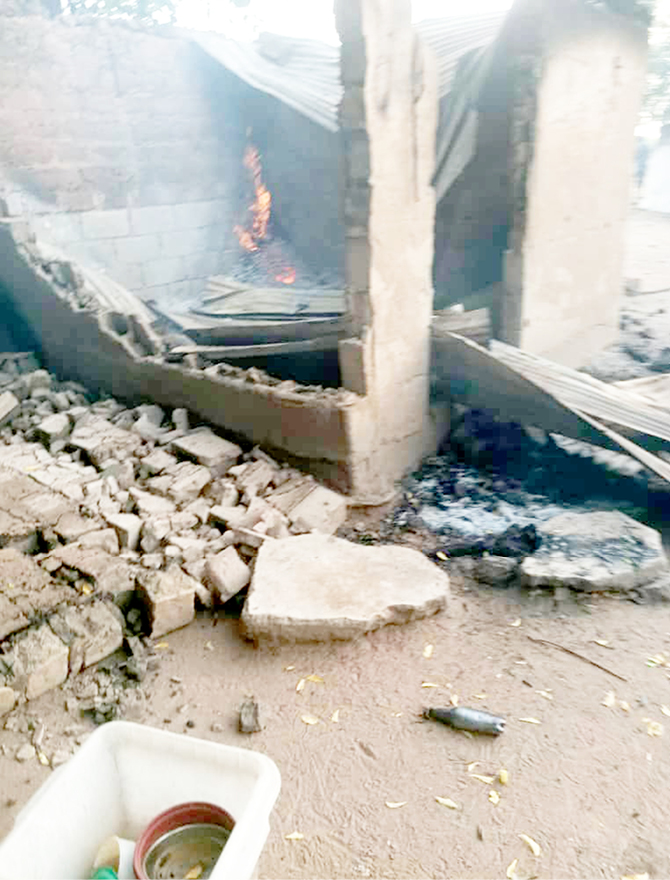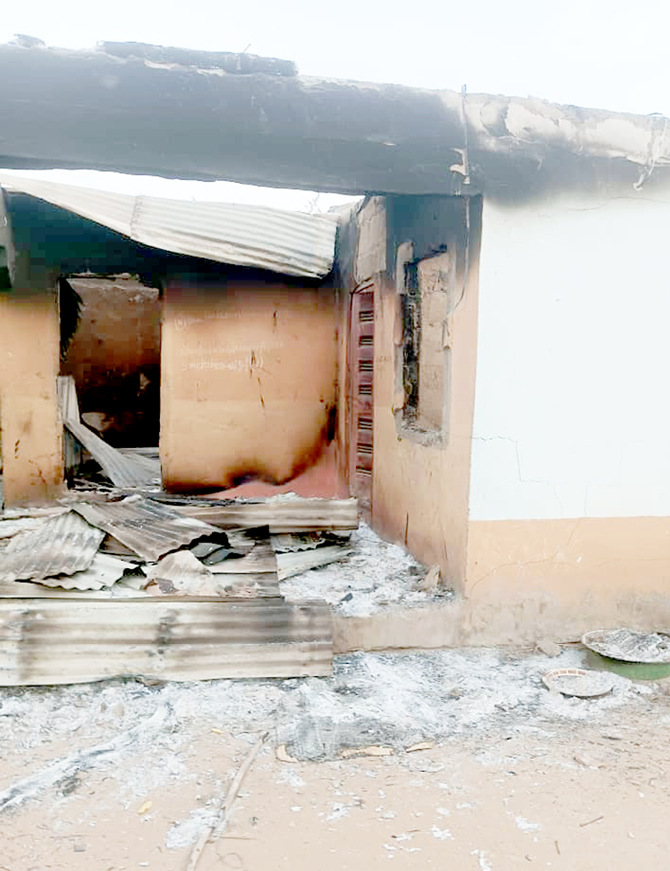How creation of chiefdoms caused crisis among communities in Taraba
The creation of new chiefdoms by Governor Darius Ishaku of Taraba State has caused a crisis among community members, leading to the loss of lives and properties in the state. In this report, indigenes and stakeholders give an insight into the growing crisis. The creation of chiefdoms by Governor Darius Ishaku of Taraba State has […]

Houses destroyed during a clash between two ethnic groups in Karim-Lamido LGA of Taraba State
The creation of new chiefdoms by Governor Darius Ishaku of Taraba State has caused a crisis among community members, leading to the loss of lives and properties in the state. In this report, indigenes and stakeholders give an insight into the growing crisis.
The creation of chiefdoms by Governor Darius Ishaku of Taraba State has caused a crisis among communities that once coexisted peacefully.
For instance, the installation of the Chief of Wurkum two weeks ago by Governor Ishaku has caused a crisis among Karimjo and Wurkum ethnic groups in Karim-Lamido.
The Karimjo ethnic group is claiming ownership of Karim-Lamido town; hence they protested the installation of a Wurkum to rule the town.
- Cut down cost of governance, AfDB President charges Tinubu
- FrieslandCampina unveils Nigeria’s first high yield crossbreeds
Wurkum is one of the major ethnic groups in Karim-Lamido Local Government Area and have been ruling the town for the past 40 years.
The new chief succeeded his late father, who died some months ago.
The Karimjo ethnic group demanded a chiefdom to be created for them in the same town but the request was not granted by Governor Ishaku.
When the new chief, who was presented with a staff of office along with 9 other newly appointed chiefs, entered Karim-Lamido town with his entourage, Karimjo youths allegedly staged a protest, which turned bloody.

Many people were killed and several houses and shops razed.
Wurkum villages around Karim-Lamido town were also razed, and villagers said they lost 20 persons. The people of Karimjo are yet to disclose the number of their casualties.
Findings by Daily Trust on Sunday revealed that over 30 people from both sides were killed and property worth millions of naira destroyed.
The police spokesman in the state, SP Usman Abdullahi, disclosed that 16 casualties were recorded during the crisis, adding that policemen and soldiers were deployed to control the situation.
Daily Trust on Sunday reports that in a nearby Jen town in the same Karim-Lamido, tension is also mounting over the appointment and installation of a new chief.
Governor Ishaku was accused of appointing the new chief outside the three recognised ruling houses in the chiefdom.
The matter is now before a High Court in Jalingo and elders of the chiefdom had to prevail on youths in the area not to cause trouble.
Similarly, stakeholders in Gassol chiefdom have dragged the Taraba State Government and Governor Ishaku to court for creating Kwarrafa chiefdom. They insist that the governor used political and ethnic sentiments in creating the new chiefdom.
“We secured court injunction that stopped the governor from installing a chief for Kwarrafa pending the determination on the suit we filed challenging the government, but he went ahead and installed the new chief in disregard to court directives,” the stakeholders said.
Communities of Garin Magaji in Gassol Local Government Area also engaged in bloody crisis over chieftaincy tussle.
The house of the new chief in the town was razed by irate youths while shops were looted.
Mallam Yakubu Saidu said Governor Ishaku had politicised the appointment of traditional rulers by not following the proper procedure and culture of the people.
He said rather than uniting the people, the creation of chiefdoms and appointment of rulers had brought disunity among various communities in the state.
Also, many people are not happy with the creation of 9 new chiefdoms out of Wukari in southern Taraba, where the Aku Uka served as a paramount ruler.
In all, 84 chiefdoms were created and upgraded for different ethnic groups across 16 local government areas.
In some areas, the chiefdoms were welcome, but in many communities it brought hostility among ethnic groups.
Before the coming of the Darius Ishaku administration in 2015, there were seven first class chiefs, out of which two stools were vacant.
The first class chiefs were the Emir of Muri, Aku Uka of Wukari, Kpanti Zing, Gara of Donga, Lamdo Gashaka, Ukwe Takum and chief of Mambilla.
The stool of the chief of Mambilla and that of Ukwe Takum were vacant.
In 2014, a former acting governor of the state, Alhaji Garba Umar, appointed Audu Bajju as the new chief of Mambilla.
Ishaku created seven additional chiefdoms out of Mambilla.
The governor did not attend to the vacant stool of UkweTakum because of the controversy surrounding the chiefdom.
Past governments failed to appoint a new chief because of the interest of some people.
While the people of Kutep insist that the stool of UkweTakum was for them, Jukun and Chamba ethnic groups in Takum also laid claim to it.
It was rumoured recently that there was an attempt to create two more chiefdoms out of Takum— one for Chamba and another for Jukun, while the Kutep would have the Ukwe Takum.
Daily Trust on Sunday learnt that the state government dropped the idea because of the dispute surrounding the stool of UkweTakum.
Our correspondent also gathered that in a bid to realise his agenda of giving each tribe a chiefdom, the governor is planning to create seven more despite having few days to vacate office. Taraba State has over 100 tribes.
Another chiefdom was created from Bakundi in Bali Local Government Area.
Kuru Jibu chiefdom was created in the same town, where the palace of the traditional ruler is located not more than three kilometres from the palace of the Chief of Bakundi.
Apart from the Kuru Jibu chiefdom, additional ones were created out of Bakundi.
In Kurmi Local Government Area, creation of chiefdoms has also caused disaffection among some communities.
One of the stakeholders in the area, Mr David James, told Daily Trust on Sunday that the people needed infrastructure for development, such as roads, electricity and water, but the Ishaku administration failed to pay attention to such things, instead he concentrated on creating chiefdoms.
He said that most monarchs, especially those appointed by the governor, did not have palaces or official vehicles.
A politician in Takum, Mr Charles Victor, said the governor, however, failed to achieve his agenda of winning senatorial election in southern Taraba through the creation of chiefdoms to please various communities.
